
instructor
structured outputs for llms
Stars: 9986

Instructor is a popular Python library for managing structured outputs from large language models (LLMs). It offers a user-friendly API for validation, retries, and streaming responses. With support for various LLM providers and multiple languages, Instructor simplifies working with LLM outputs. The library includes features like response models, retry management, validation, streaming support, and flexible backends. It also provides hooks for logging and monitoring LLM interactions, and supports integration with Anthropic, Cohere, Gemini, Litellm, and Google AI models. Instructor facilitates tasks such as extracting user data from natural language, creating fine-tuned models, managing uploaded files, and monitoring usage of OpenAI models.
README:
Instructor is the most popular Python library for working with structured outputs from large language models (LLMs), boasting over 1 million monthly downloads. Built on top of Pydantic, it provides a simple, transparent, and user-friendly API to manage validation, retries, and streaming responses. Get ready to supercharge your LLM workflows with the community's top choice!
If your company uses Instructor a lot, we'd love to have your logo on our website! Please fill out this form
- Response Models: Specify Pydantic models to define the structure of your LLM outputs
- Retry Management: Easily configure the number of retry attempts for your requests
- Validation: Ensure LLM responses conform to your expectations with Pydantic validation
- Streaming Support: Work with Lists and Partial responses effortlessly
- Flexible Backends: Seamlessly integrate with various LLM providers beyond OpenAI
- Support in many Languages: We support many languages including Python, TypeScript, Ruby, Go, and Elixir
Install Instructor with a single command:
pip install -U instructorNow, let's see Instructor in action with a simple example:
import instructor
from pydantic import BaseModel
from openai import OpenAI
# Define your desired output structure
class UserInfo(BaseModel):
name: str
age: int
# Patch the OpenAI client
client = instructor.from_openai(OpenAI())
# Extract structured data from natural language
user_info = client.chat.completions.create(
model="gpt-4o-mini",
response_model=UserInfo,
messages=[{"role": "user", "content": "John Doe is 30 years old."}],
)
print(user_info.name)
#> John Doe
print(user_info.age)
#> 30Instructor provides a powerful hooks system that allows you to intercept and log various stages of the LLM interaction process. Here's a simple example demonstrating how to use hooks:
import instructor
from openai import OpenAI
from pydantic import BaseModel
class UserInfo(BaseModel):
name: str
age: int
# Initialize the OpenAI client with Instructor
client = instructor.from_openai(OpenAI())
# Define hook functions
def log_kwargs(**kwargs):
print(f"Function called with kwargs: {kwargs}")
def log_exception(exception: Exception):
print(f"An exception occurred: {str(exception)}")
client.on("completion:kwargs", log_kwargs)
client.on("completion:error", log_exception)
user_info = client.chat.completions.create(
model="gpt-4o-mini",
response_model=UserInfo,
messages=[
{"role": "user", "content": "Extract the user name: 'John is 20 years old'"}
],
)
"""
{
'args': (),
'kwargs': {
'messages': [
{
'role': 'user',
'content': "Extract the user name: 'John is 20 years old'",
}
],
'model': 'gpt-4o-mini',
'tools': [
{
'type': 'function',
'function': {
'name': 'UserInfo',
'description': 'Correctly extracted `UserInfo` with all the required parameters with correct types',
'parameters': {
'properties': {
'name': {'title': 'Name', 'type': 'string'},
'age': {'title': 'Age', 'type': 'integer'},
},
'required': ['age', 'name'],
'type': 'object',
},
},
}
],
'tool_choice': {'type': 'function', 'function': {'name': 'UserInfo'}},
},
}
"""
print(f"Name: {user_info.name}, Age: {user_info.age}")
#> Name: John, Age: 20This example demonstrates:
- A pre-execution hook that logs all kwargs passed to the function.
- An exception hook that logs any exceptions that occur during execution.
The hooks provide valuable insights into the function's inputs and any errors, enhancing debugging and monitoring capabilities.
import instructor
from anthropic import Anthropic
from pydantic import BaseModel
class User(BaseModel):
name: str
age: int
client = instructor.from_anthropic(Anthropic())
# note that client.chat.completions.create will also work
resp = client.messages.create(
model="claude-3-opus-20240229",
max_tokens=1024,
system="You are a world class AI that excels at extracting user data from a sentence",
messages=[
{
"role": "user",
"content": "Extract Jason is 25 years old.",
}
],
response_model=User,
)
assert isinstance(resp, User)
assert resp.name == "Jason"
assert resp.age == 25Make sure to install cohere and set your system environment variable with export CO_API_KEY=<YOUR_COHERE_API_KEY>.
pip install cohere
import instructor
import cohere
from pydantic import BaseModel
class User(BaseModel):
name: str
age: int
client = instructor.from_cohere(cohere.Client())
# note that client.chat.completions.create will also work
resp = client.chat.completions.create(
model="command-r-plus",
max_tokens=1024,
messages=[
{
"role": "user",
"content": "Extract Jason is 25 years old.",
}
],
response_model=User,
)
assert isinstance(resp, User)
assert resp.name == "Jason"
assert resp.age == 25Make sure you install the Google AI Python SDK. You should set a GOOGLE_API_KEY environment variable with your API key.
Gemini tool calling also requires jsonref to be installed.
pip install google-generativeai jsonref
import instructor
import google.generativeai as genai
from pydantic import BaseModel
class User(BaseModel):
name: str
age: int
# genai.configure(api_key=os.environ["API_KEY"]) # alternative API key configuration
client = instructor.from_gemini(
client=genai.GenerativeModel(
model_name="models/gemini-1.5-flash-latest", # model defaults to "gemini-pro"
),
mode=instructor.Mode.GEMINI_JSON,
)Alternatively, you can call Gemini from the OpenAI client. You'll have to setup gcloud, get setup on Vertex AI, and install the Google Auth library.
pip install google-authimport google.auth
import google.auth.transport.requests
import instructor
from openai import OpenAI
from pydantic import BaseModel
creds, project = google.auth.default()
auth_req = google.auth.transport.requests.Request()
creds.refresh(auth_req)
# Pass the Vertex endpoint and authentication to the OpenAI SDK
PROJECT = 'PROJECT_ID'
LOCATION = (
'LOCATION' # https://cloud.google.com/vertex-ai/generative-ai/docs/learn/locations
)
base_url = f'https://{LOCATION}-aiplatform.googleapis.com/v1beta1/projects/{PROJECT}/locations/{LOCATION}/endpoints/openapi'
client = instructor.from_openai(
OpenAI(base_url=base_url, api_key=creds.token), mode=instructor.Mode.JSON
)
# JSON mode is req'd
class User(BaseModel):
name: str
age: int
resp = client.chat.completions.create(
model="google/gemini-1.5-flash-001",
max_tokens=1024,
messages=[
{
"role": "user",
"content": "Extract Jason is 25 years old.",
}
],
response_model=User,
)
assert isinstance(resp, User)
assert resp.name == "Jason"
assert resp.age == 25import instructor
from openai import OpenAI
from pydantic import BaseModel
class User(BaseModel):
name: str
age: int
client = instructor.from_perplexity(OpenAI(base_url="https://api.perplexity.ai"))
resp = client.chat.completions.create(
model="sonar",
messages=[
{
"role": "user",
"content": "Extract Jason is 25 years old.",
}
],
response_model=User,
)
assert isinstance(resp, User)
assert resp.name == "Jason"
assert resp.age == 25import instructor
from litellm import completion
from pydantic import BaseModel
class User(BaseModel):
name: str
age: int
client = instructor.from_litellm(completion)
resp = client.chat.completions.create(
model="claude-3-opus-20240229",
max_tokens=1024,
messages=[
{
"role": "user",
"content": "Extract Jason is 25 years old.",
}
],
response_model=User,
)
assert isinstance(resp, User)
assert resp.name == "Jason"
assert resp.age == 25This was the dream of Instructor but due to the patching of OpenAI, it wasn't possible for me to get typing to work well. Now, with the new client, we can get typing to work well! We've also added a few create_* methods to make it easier to create iterables and partials, and to access the original completion.
import openai
import instructor
from pydantic import BaseModel
class User(BaseModel):
name: str
age: int
client = instructor.from_openai(openai.OpenAI())
user = client.chat.completions.create(
model="gpt-4-turbo-preview",
messages=[
{"role": "user", "content": "Create a user"},
],
response_model=User,
)Now if you use an IDE, you can see the type is correctly inferred.
This will also work correctly with asynchronous clients.
import openai
import instructor
from pydantic import BaseModel
client = instructor.from_openai(openai.AsyncOpenAI())
class User(BaseModel):
name: str
age: int
async def extract():
return await client.chat.completions.create(
model="gpt-4-turbo-preview",
messages=[
{"role": "user", "content": "Create a user"},
],
response_model=User,
)Notice that simply because we return the create method, the extract() function will return the correct user type.
You can also return the original completion object
import openai
import instructor
from pydantic import BaseModel
client = instructor.from_openai(openai.OpenAI())
class User(BaseModel):
name: str
age: int
user, completion = client.chat.completions.create_with_completion(
model="gpt-4-turbo-preview",
messages=[
{"role": "user", "content": "Create a user"},
],
response_model=User,
)In order to handle streams, we still support Iterable[T] and Partial[T] but to simplify the type inference, we've added create_iterable and create_partial methods as well!
import openai
import instructor
from pydantic import BaseModel
client = instructor.from_openai(openai.OpenAI())
class User(BaseModel):
name: str
age: int
user_stream = client.chat.completions.create_partial(
model="gpt-4-turbo-preview",
messages=[
{"role": "user", "content": "Create a user"},
],
response_model=User,
)
for user in user_stream:
print(user)
#> name=None age=None
#> name=None age=None
#> name=None age=None
#> name=None age=None
#> name=None age=None
#> name=None age=None
#> name='John Doe' age=None
#> name='John Doe' age=None
#> name='John Doe' age=None
#> name='John Doe' age=30
#> name='John Doe' age=30
# name=None age=None
# name='' age=None
# name='John' age=None
# name='John Doe' age=None
# name='John Doe' age=30Notice now that the type inferred is Generator[User, None]
We get an iterable of objects when we want to extract multiple objects.
import openai
import instructor
from pydantic import BaseModel
client = instructor.from_openai(openai.OpenAI())
class User(BaseModel):
name: str
age: int
users = client.chat.completions.create_iterable(
model="gpt-4-turbo-preview",
messages=[
{"role": "user", "content": "Create 2 users"},
],
response_model=User,
)
for user in users:
print(user)
#> name='John Doe' age=30
#> name='Jane Doe' age=28
# User(name='John Doe', age=30)
# User(name='Jane Smith', age=25)We invite you to contribute to evals in pytest as a way to monitor the quality of the OpenAI models and the instructor library. To get started check out the evals for Anthropic and OpenAI and contribute your own evals in the form of pytest tests. These evals will be run once a week and the results will be posted.
We welcome contributions to Instructor! Whether you're fixing bugs, adding features, improving documentation, or writing blog posts, your help is appreciated.
If you're new to the project, check out issues marked as good-first-issue or help-wanted. These could be anything from code improvements, a guest blog post, or a new cookbook.
-
Fork and clone the repository
git clone https://github.com/YOUR-USERNAME/instructor.git cd instructor -
Set up the development environment
We use
uvto manage dependencies, which provides faster package installation and dependency resolution than traditional tools. If you don't haveuvinstalled, install it first.# Create and activate a virtual environment uv venv .venv source .venv/bin/activate # On Windows: .venv\Scripts\activate # Install dependencies with all extras # You can specify specific groups if needed uv sync --all-extras --group dev # Or for a specific integration # uv sync --all-extras --group dev,anthropic
-
Install pre-commit hooks
We use pre-commit hooks to ensure code quality:
uv pip install pre-commit pre-commit install
This will automatically run Ruff formatters and linting checks before each commit, ensuring your code meets our style guidelines.
Tests help ensure that your contributions don't break existing functionality:
# Run all tests
uv run pytest
# Run specific tests
uv run pytest tests/path/to/test_file.py
# Run tests with coverage reporting
uv run pytest --cov=instructorWhen submitting a PR, make sure to write tests for any new functionality and verify that all tests pass locally.
We maintain high code quality standards to keep the codebase maintainable and consistent:
-
Formatting and Linting: We use
rufffor code formatting and linting, andpyrightfor type checking.# Check code formatting uv run ruff format --check # Apply formatting uv run ruff format # Run linter uv run ruff check # Fix auto-fixable linting issues uv run ruff check --fix
-
Type Hints: All new code should include proper type hints.
-
Documentation: Code should be well-documented with docstrings and comments where appropriate.
Make sure these checks pass when you submit a PR:
- Linting:
uv run ruff check - Formatting:
uv run ruff format - Type checking:
uv run pyright
-
Create a branch for your changes
git checkout -b feature/your-feature-name
-
Make your changes and commit them
git add . git commit -m "Your descriptive commit message"
-
Keep your branch updated with the main repository
git remote add upstream https://github.com/instructor-ai/instructor.git git fetch upstream git rebase upstream/main
-
Push your changes
git push origin feature/your-feature-name
-
Create a Pull Request from your fork to the main repository.
-
Fill out the PR template with a description of your changes, relevant issue numbers, and any other information that would help reviewers understand your contribution.
-
Address review feedback and make any requested changes.
-
Wait for CI checks to pass. The PR will be reviewed by maintainers once all checks are green.
-
Merge: Once approved, a maintainer will merge your PR.
We encourage contributions to our evaluation tests. See the Evals documentation for details on writing and running evaluation tests.
We use pre-commit hooks to ensure code quality. To set up pre-commit hooks:
- Install pre-commit:
pip install pre-commit - Set up the hooks:
pre-commit install
This will automatically run Ruff formatters and linting checks before each commit, ensuring your code meets our style guidelines.
We also provide some added CLI functionality for easy convenience:
-
instructor jobs: This helps with the creation of fine-tuning jobs with OpenAI. Simple useinstructor jobs create-from-file --helpto get started creating your first fine-tuned GPT-3.5 model -
instructor files: Manage your uploaded files with ease. You'll be able to create, delete and upload files all from the command line -
instructor usage: Instead of heading to the OpenAI site each time, you can monitor your usage from the CLI and filter by date and time period. Note that usage often takes ~5-10 minutes to update from OpenAI's side
This project is licensed under the terms of the MIT License.
If you use Instructor in your research, please cite it using the following BibTeX:
@software{liu2024instructor,
author = {Jason Liu and Contributors},
title = {Instructor: A library for structured outputs from large language models},
url = {https://github.com/instructor-ai/instructor},
year = {2024},
month = {3}
}For Tasks:
Click tags to check more tools for each tasksFor Jobs:
Alternative AI tools for instructor
Similar Open Source Tools

instructor
Instructor is a popular Python library for managing structured outputs from large language models (LLMs). It offers a user-friendly API for validation, retries, and streaming responses. With support for various LLM providers and multiple languages, Instructor simplifies working with LLM outputs. The library includes features like response models, retry management, validation, streaming support, and flexible backends. It also provides hooks for logging and monitoring LLM interactions, and supports integration with Anthropic, Cohere, Gemini, Litellm, and Google AI models. Instructor facilitates tasks such as extracting user data from natural language, creating fine-tuned models, managing uploaded files, and monitoring usage of OpenAI models.
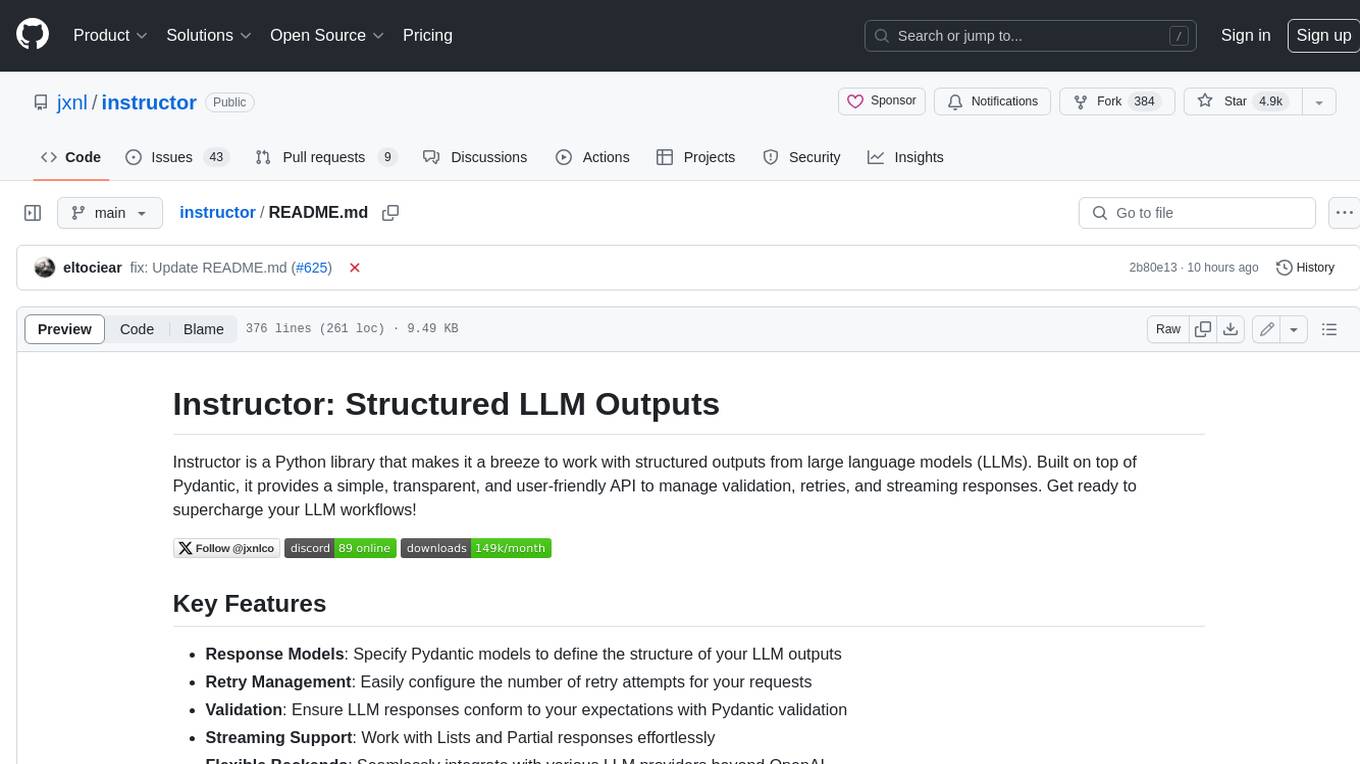
instructor
Instructor is a Python library that makes it a breeze to work with structured outputs from large language models (LLMs). Built on top of Pydantic, it provides a simple, transparent, and user-friendly API to manage validation, retries, and streaming responses. Get ready to supercharge your LLM workflows!
aiavatarkit
AIAvatarKit is a tool for building AI-based conversational avatars quickly. It supports various platforms like VRChat and cluster, along with real-world devices. The tool is extensible, allowing unlimited capabilities based on user needs. It requires VOICEVOX API, Google or Azure Speech Services API keys, and Python 3.10. Users can start conversations out of the box and enjoy seamless interactions with the avatars.
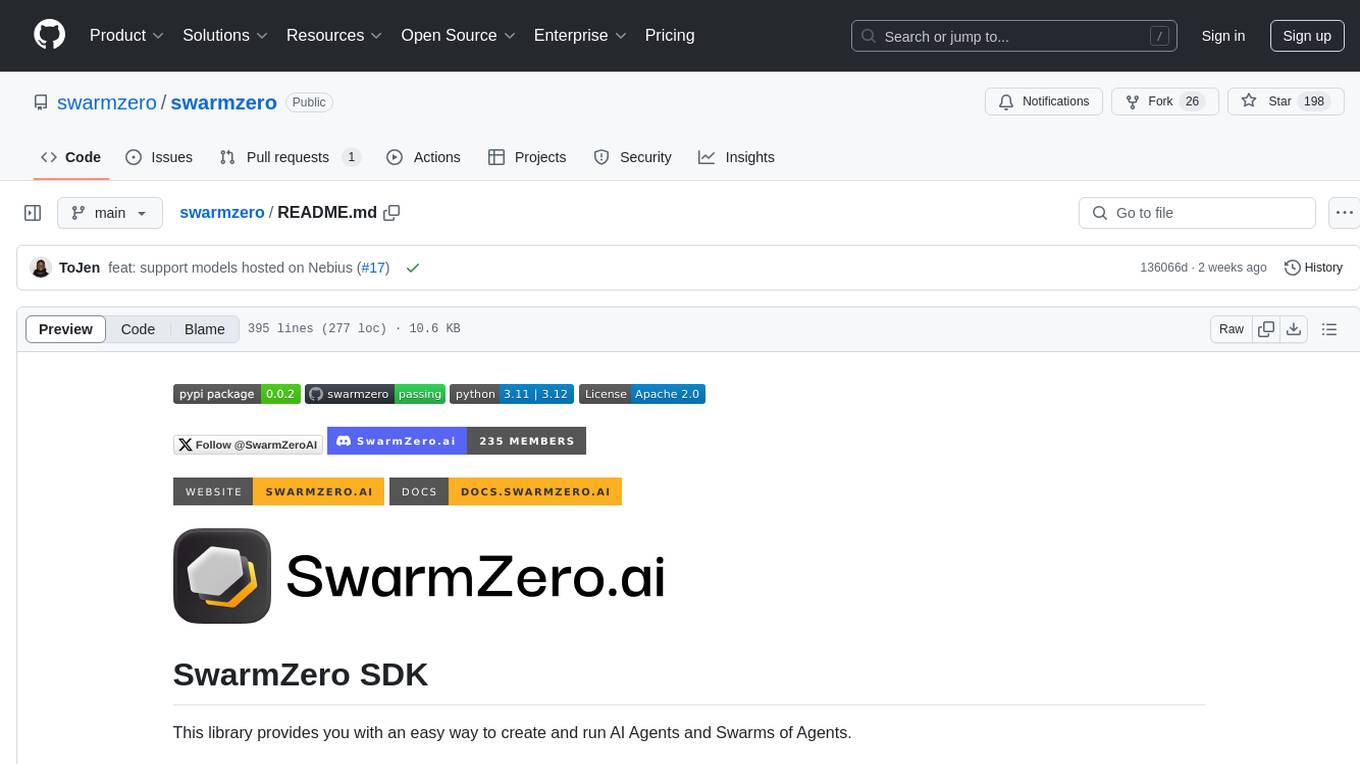
swarmzero
SwarmZero SDK is a library that simplifies the creation and execution of AI Agents and Swarms of Agents. It supports various LLM Providers such as OpenAI, Azure OpenAI, Anthropic, MistralAI, Gemini, Nebius, and Ollama. Users can easily install the library using pip or poetry, set up the environment and configuration, create and run Agents, collaborate with Swarms, add tools for complex tasks, and utilize retriever tools for semantic information retrieval. Sample prompts are provided to help users explore the capabilities of the agents and swarms. The SDK also includes detailed examples and documentation for reference.
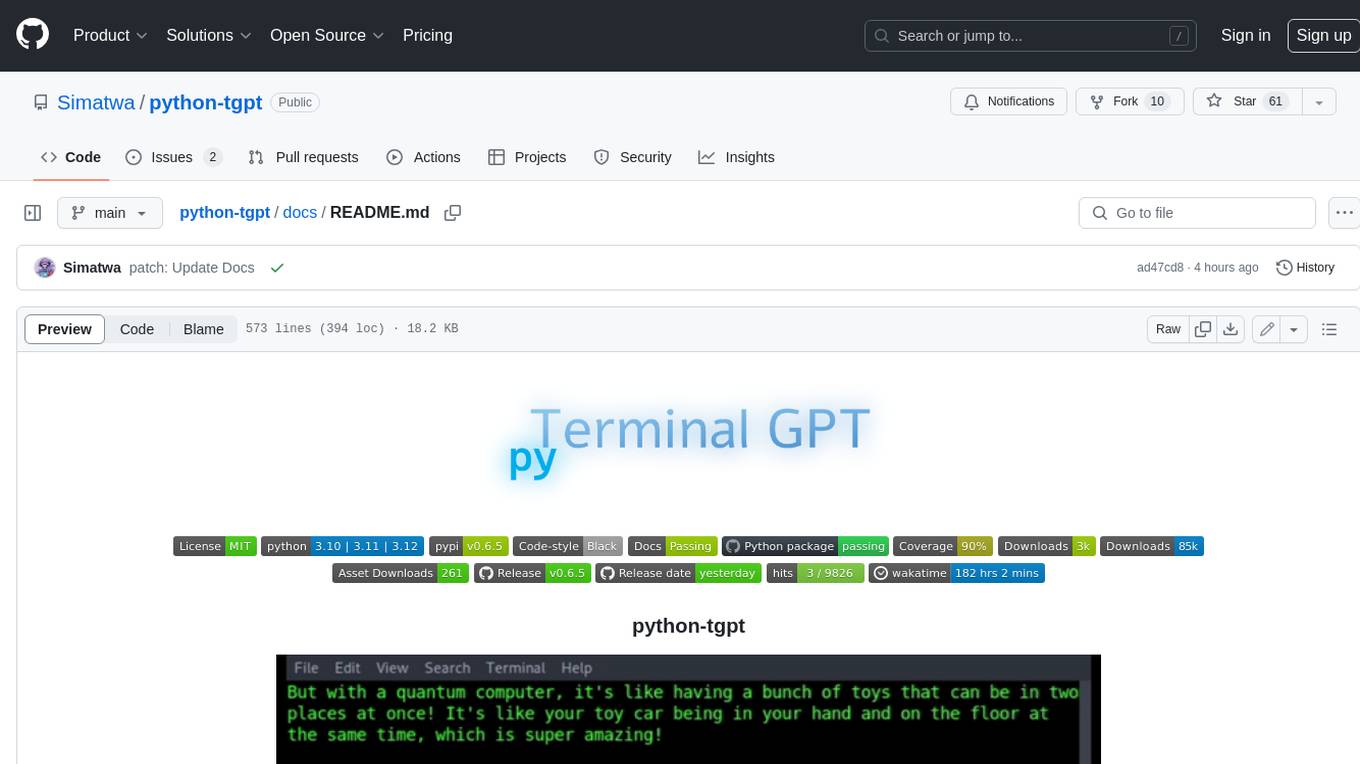
python-tgpt
Python-tgpt is a Python package that enables seamless interaction with over 45 free LLM providers without requiring an API key. It also provides image generation capabilities. The name _python-tgpt_ draws inspiration from its parent project tgpt, which operates on Golang. Through this Python adaptation, users can effortlessly engage with a number of free LLMs available, fostering a smoother AI interaction experience.
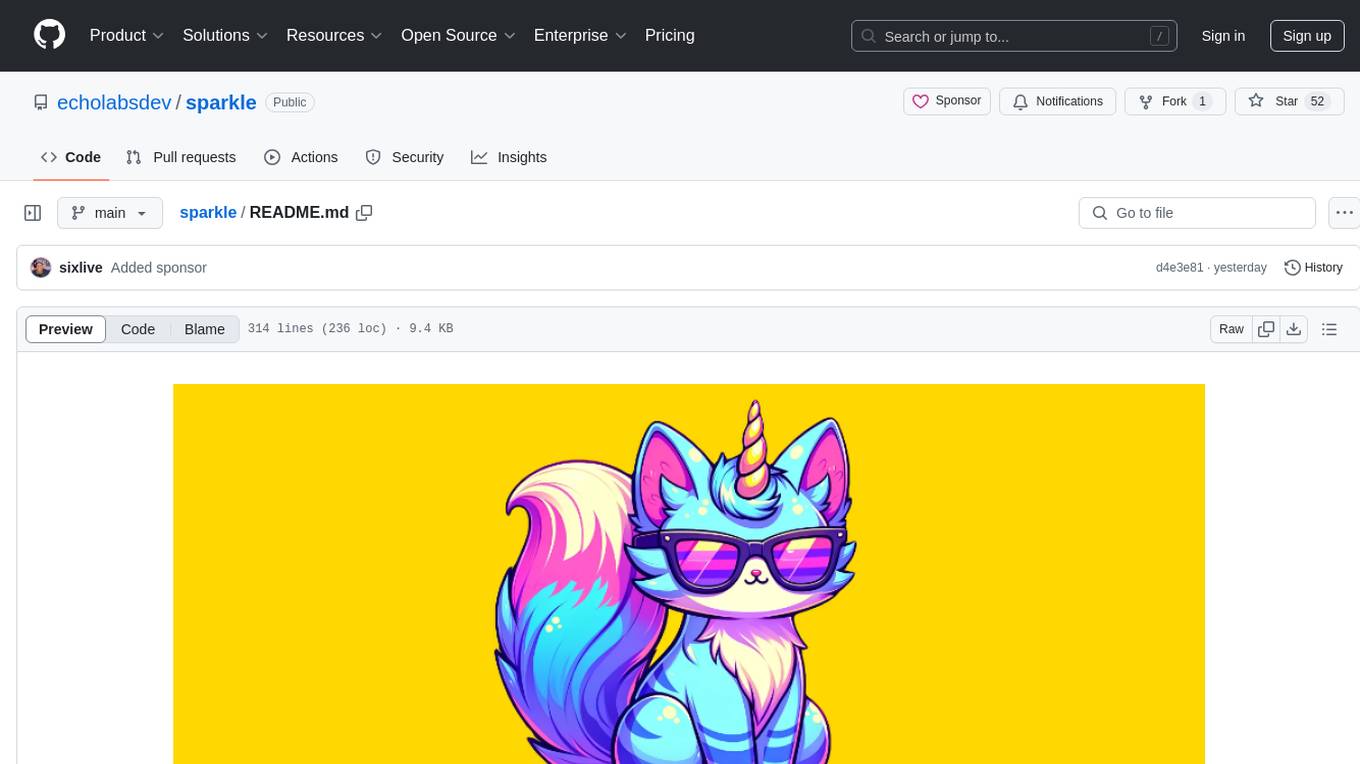
sparkle
Sparkle is a tool that streamlines the process of building AI-driven features in applications using Large Language Models (LLMs). It guides users through creating and managing agents, defining tools, and interacting with LLM providers like OpenAI. Sparkle allows customization of LLM provider settings, model configurations, and provides a seamless integration with Sparkle Server for exposing agents via an OpenAI-compatible chat API endpoint.
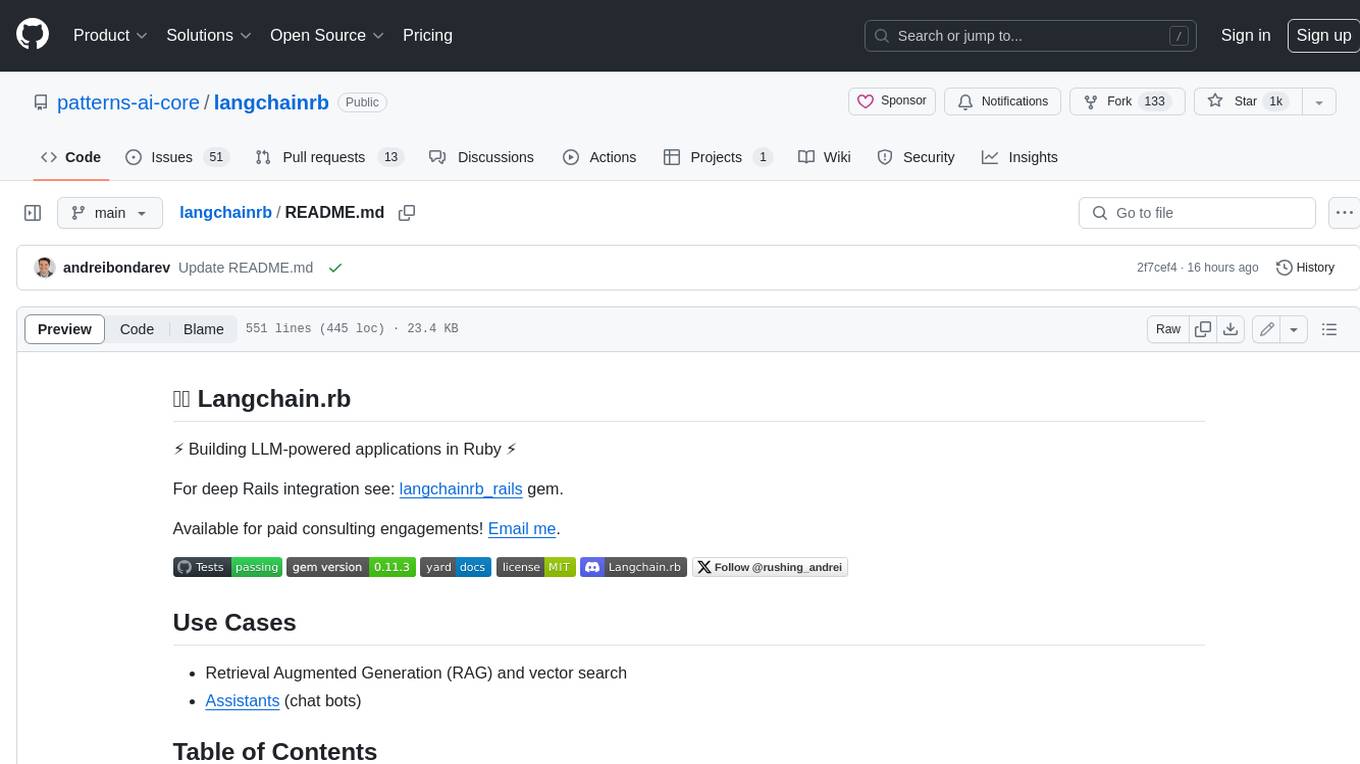
langchainrb
Langchain.rb is a Ruby library that makes it easy to build LLM-powered applications. It provides a unified interface to a variety of LLMs, vector search databases, and other tools, making it easy to build and deploy RAG (Retrieval Augmented Generation) systems and assistants. Langchain.rb is open source and available under the MIT License.
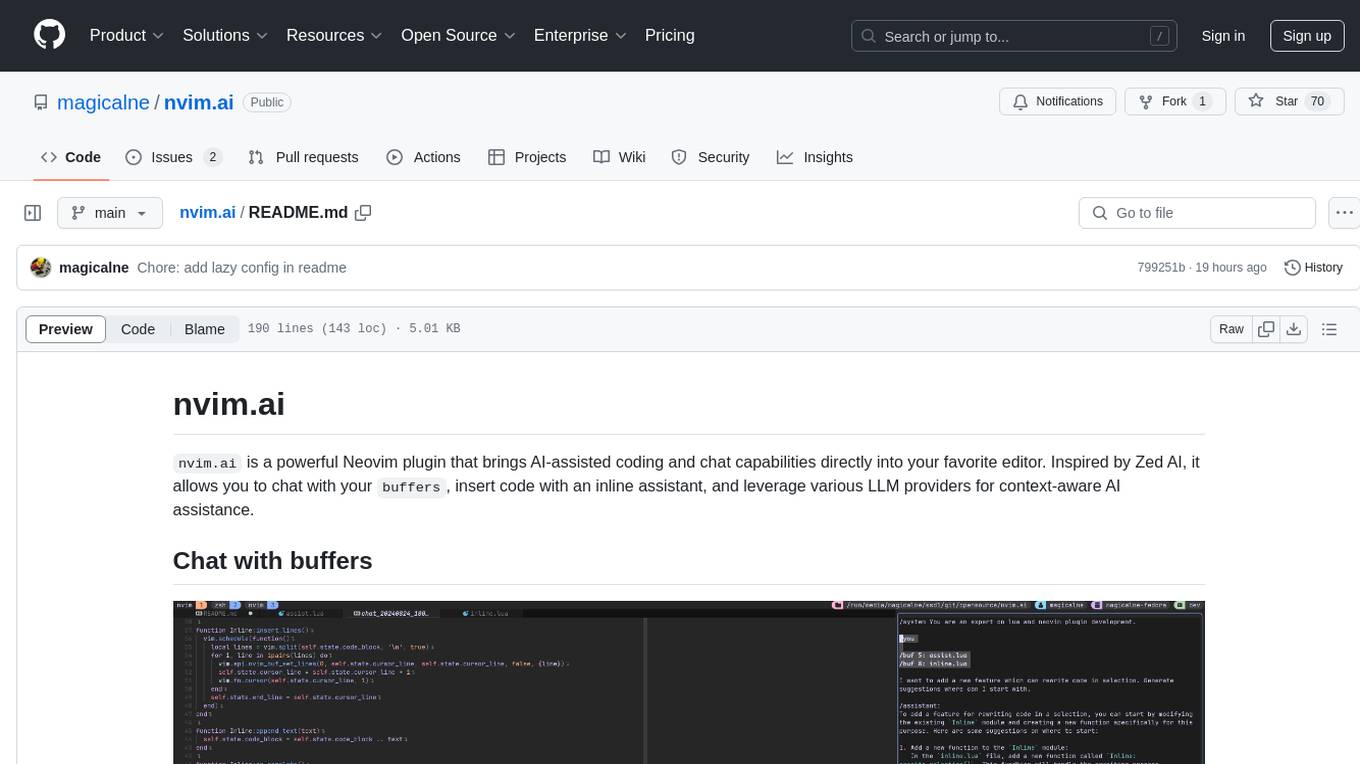
nvim.ai
nvim.ai is a powerful Neovim plugin that enables AI-assisted coding and chat capabilities within the editor. Users can chat with buffers, insert code with an inline assistant, and utilize various LLM providers for context-aware AI assistance. The plugin supports features like interacting with AI about code and documents, receiving relevant help based on current work, code insertion, code rewriting (Work in Progress), and integration with multiple LLM providers. Users can configure the plugin, add API keys to dotfiles, and integrate with nvim-cmp for command autocompletion. Keymaps are available for chat and inline assist functionalities. The chat dialog allows parsing content with keywords and supports roles like /system, /you, and /assistant. Context-aware assistance can be accessed through inline assist by inserting code blocks anywhere in the file.
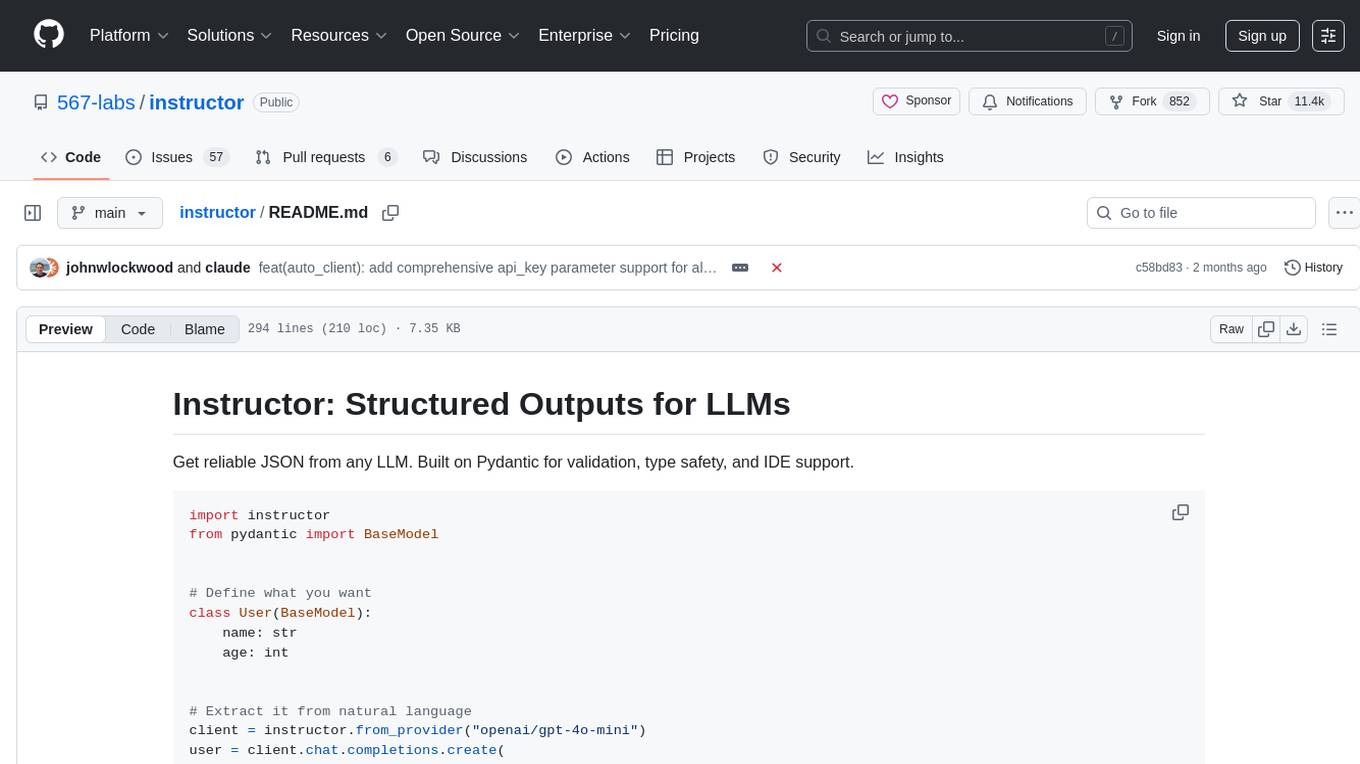
instructor
Instructor is a tool that provides structured outputs from Large Language Models (LLMs) in a reliable manner. It simplifies the process of extracting structured data by utilizing Pydantic for validation, type safety, and IDE support. With Instructor, users can define models and easily obtain structured data without the need for complex JSON parsing, error handling, or retries. The tool supports automatic retries, streaming support, and extraction of nested objects, making it production-ready for various AI applications. Trusted by a large community of developers and companies, Instructor is used by teams at OpenAI, Google, Microsoft, AWS, and YC startups.
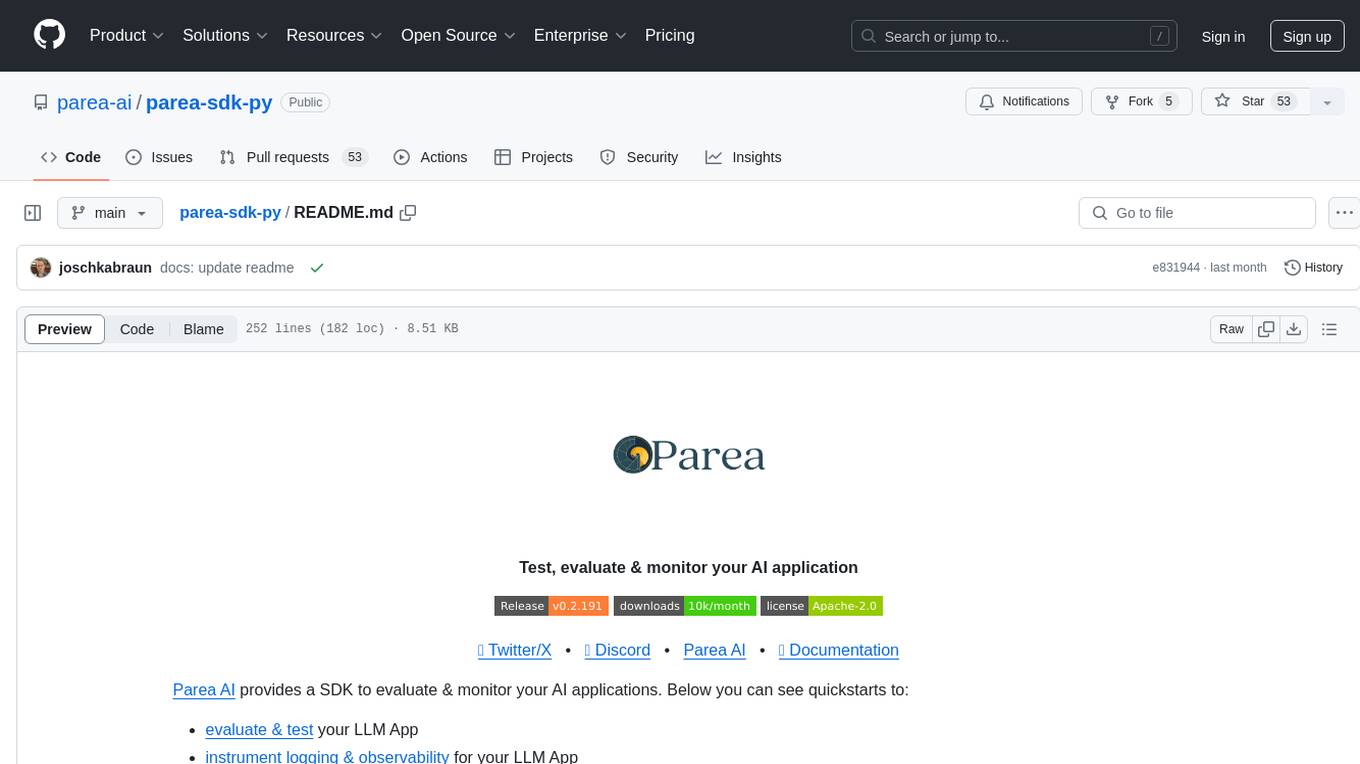
parea-sdk-py
Parea AI provides a SDK to evaluate & monitor AI applications. It allows users to test, evaluate, and monitor their AI models by defining and running experiments. The SDK also enables logging and observability for AI applications, as well as deploying prompts to facilitate collaboration between engineers and subject-matter experts. Users can automatically log calls to OpenAI and Anthropic, create hierarchical traces of their applications, and deploy prompts for integration into their applications.
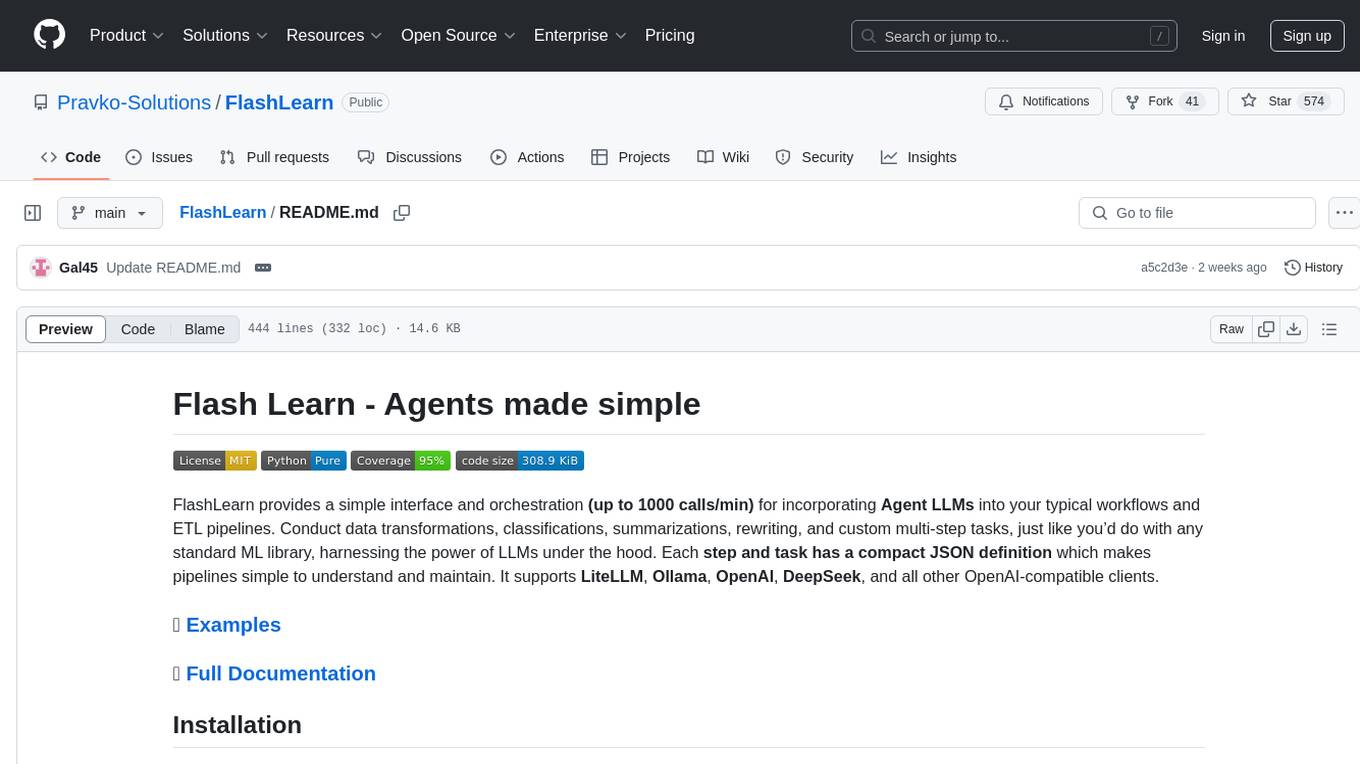
FlashLearn
FlashLearn is a tool that provides a simple interface and orchestration for incorporating Agent LLMs into workflows and ETL pipelines. It allows data transformations, classifications, summarizations, rewriting, and custom multi-step tasks using LLMs. Each step and task has a compact JSON definition, making pipelines easy to understand and maintain. FlashLearn supports LiteLLM, Ollama, OpenAI, DeepSeek, and other OpenAI-compatible clients.
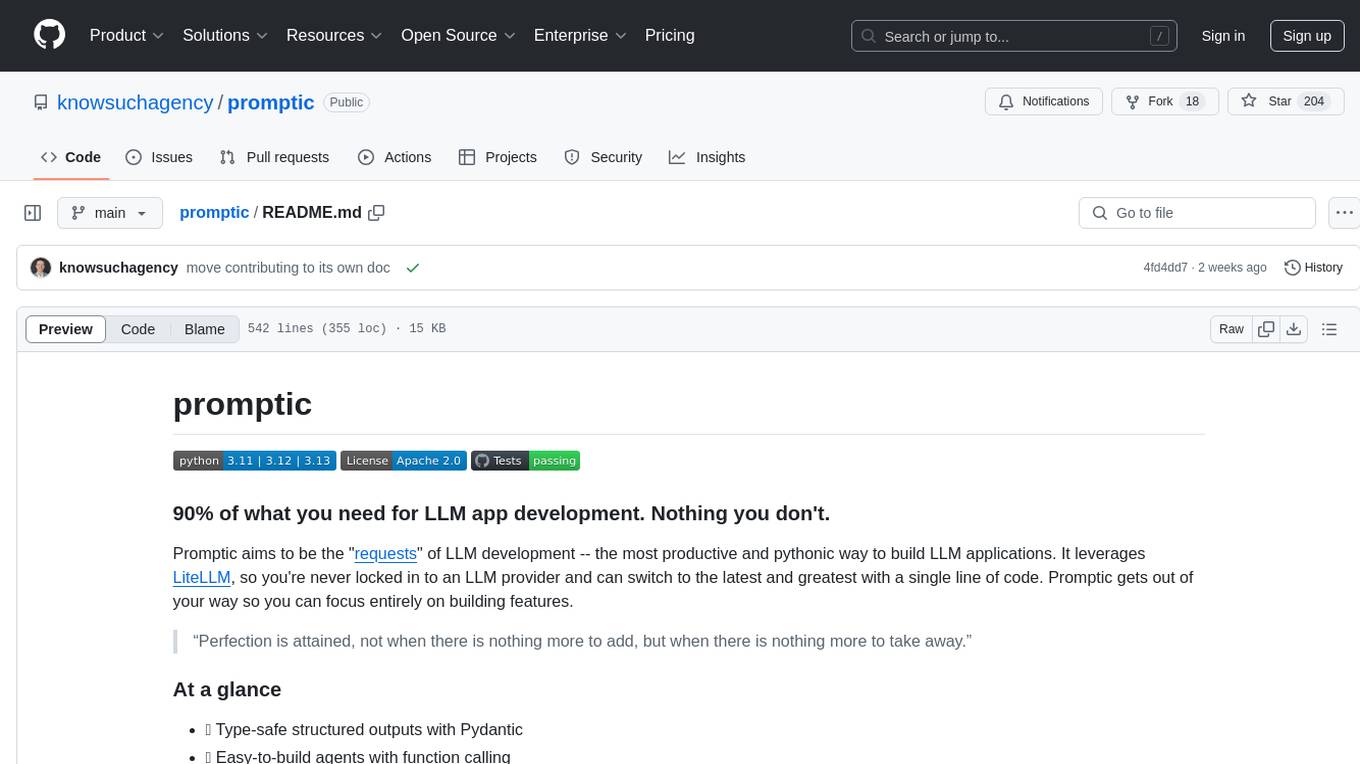
promptic
Promptic is a tool designed for LLM app development, providing a productive and pythonic way to build LLM applications. It leverages LiteLLM, allowing flexibility to switch LLM providers easily. Promptic focuses on building features by providing type-safe structured outputs, easy-to-build agents, streaming support, automatic prompt caching, and built-in conversation memory.
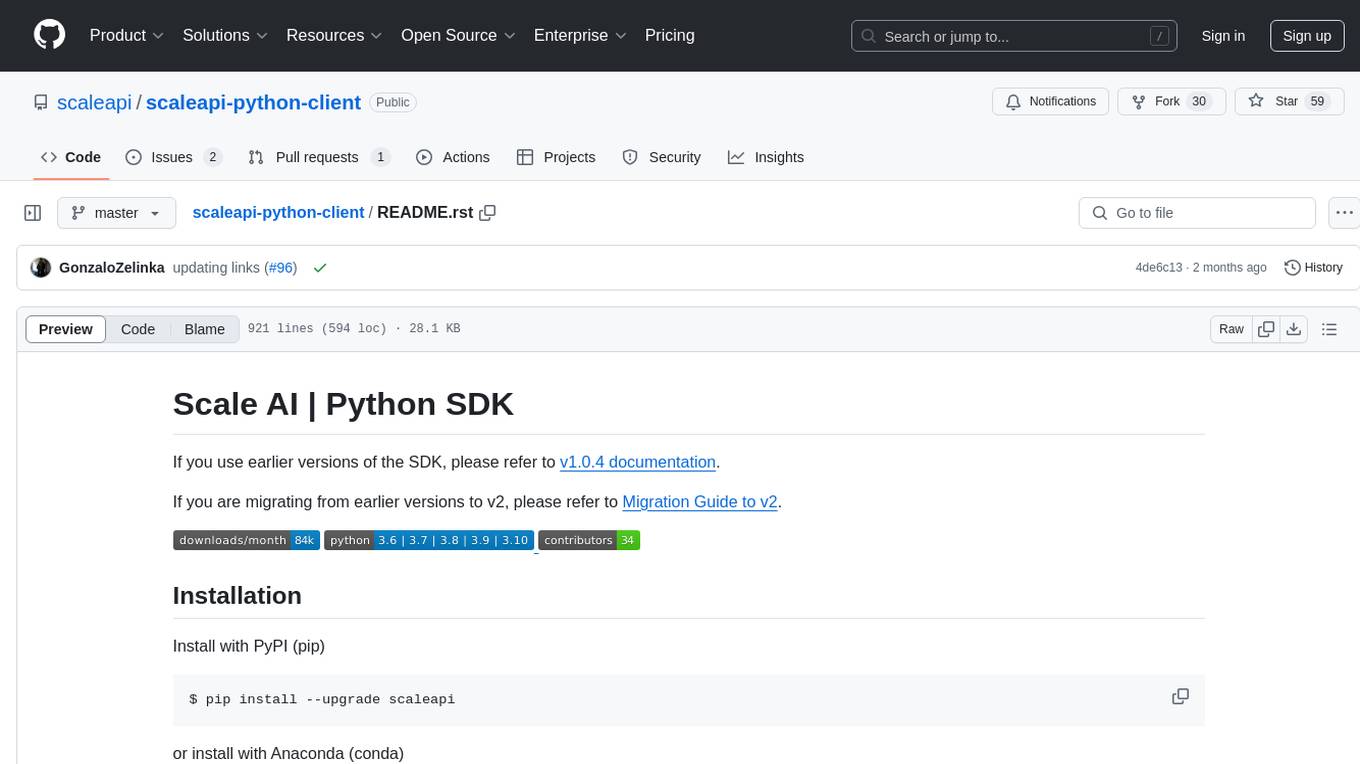
scaleapi-python-client
The Scale AI Python SDK is a tool that provides a Python interface for interacting with the Scale API. It allows users to easily create tasks, manage projects, upload files, and work with evaluation tasks, training tasks, and Studio assignments. The SDK handles error handling and provides detailed documentation for each method. Users can also manage teammates, project groups, and batches within the Scale Studio environment. The SDK supports various functionalities such as creating tasks, retrieving tasks, canceling tasks, auditing tasks, updating task attributes, managing files, managing team members, and working with evaluation and training tasks.
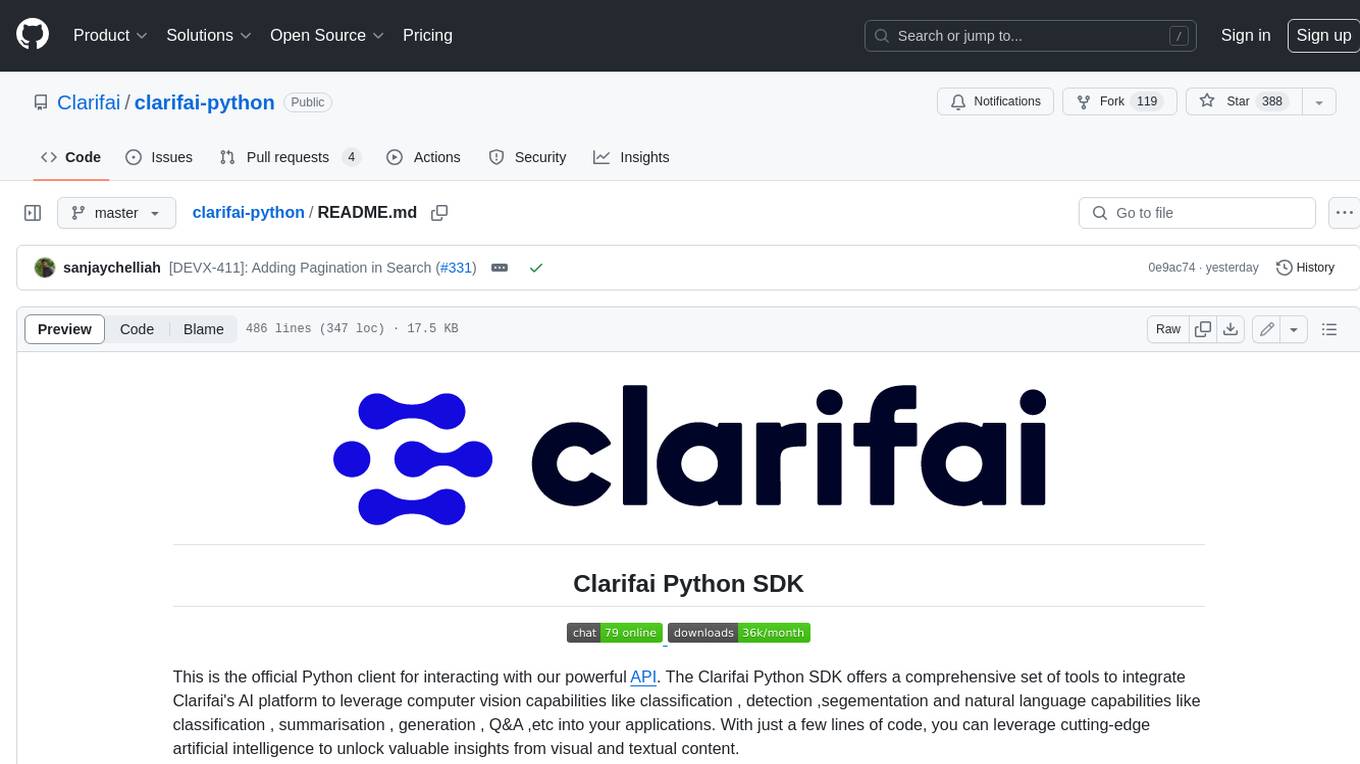
clarifai-python
The Clarifai Python SDK offers a comprehensive set of tools to integrate Clarifai's AI platform to leverage computer vision capabilities like classification , detection ,segementation and natural language capabilities like classification , summarisation , generation , Q&A ,etc into your applications. With just a few lines of code, you can leverage cutting-edge artificial intelligence to unlock valuable insights from visual and textual content.
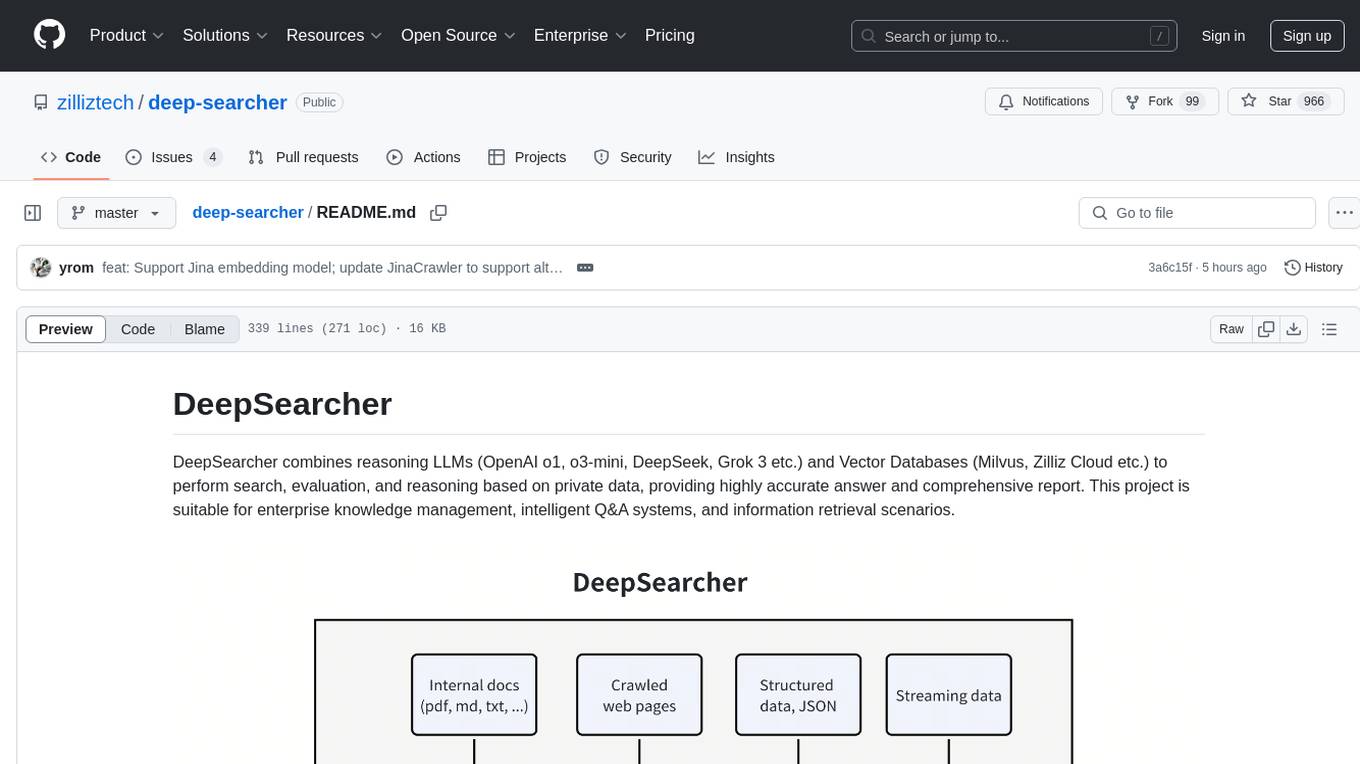
deep-searcher
DeepSearcher is a tool that combines reasoning LLMs and Vector Databases to perform search, evaluation, and reasoning based on private data. It is suitable for enterprise knowledge management, intelligent Q&A systems, and information retrieval scenarios. The tool maximizes the utilization of enterprise internal data while ensuring data security, supports multiple embedding models, and provides support for multiple LLMs for intelligent Q&A and content generation. It also includes features like private data search, vector database management, and document loading with web crawling capabilities under development.
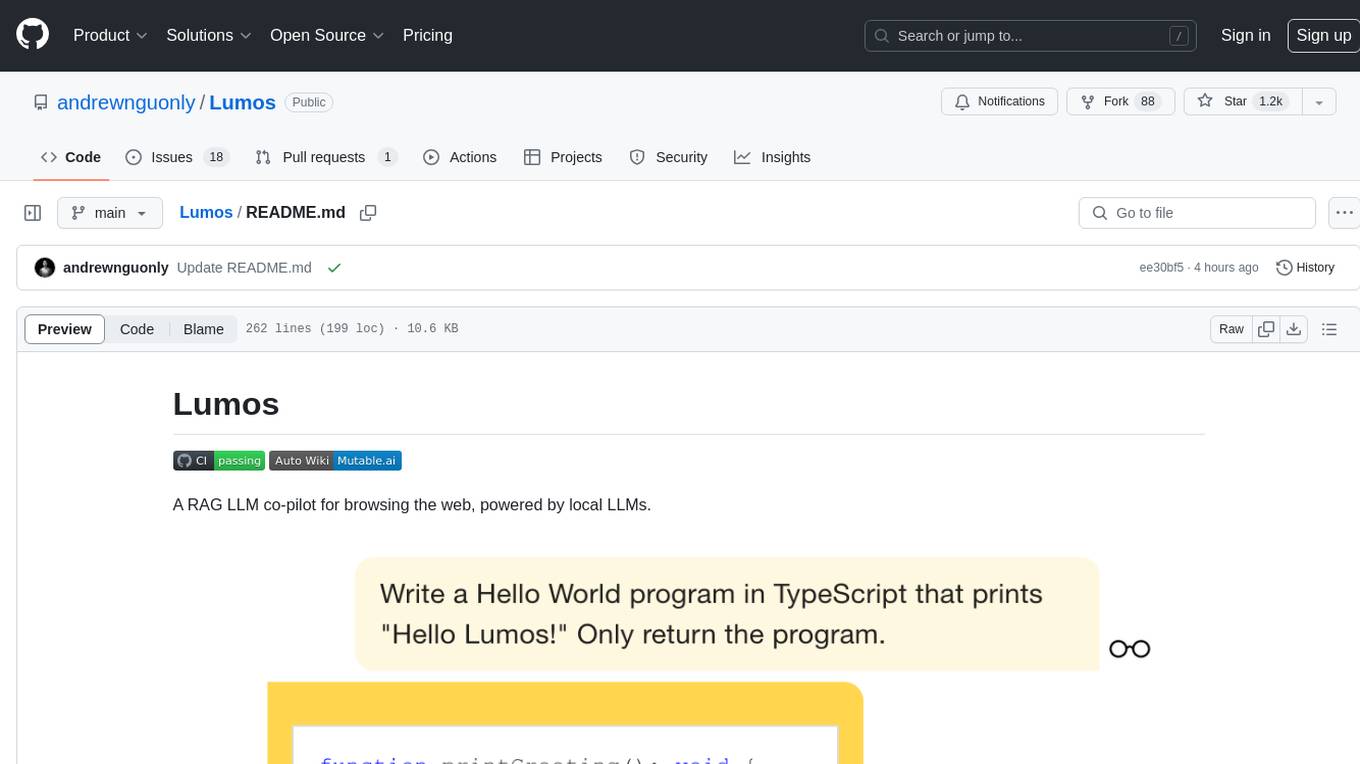
Lumos
Lumos is a Chrome extension powered by a local LLM co-pilot for browsing the web. It allows users to summarize long threads, news articles, and technical documentation. Users can ask questions about reviews and product pages. The tool requires a local Ollama server for LLM inference and embedding database. Lumos supports multimodal models and file attachments for processing text and image content. It also provides options to customize models, hosts, and content parsers. The extension can be easily accessed through keyboard shortcuts and offers tools for automatic invocation based on prompts.
For similar tasks

instructor
Instructor is a popular Python library for managing structured outputs from large language models (LLMs). It offers a user-friendly API for validation, retries, and streaming responses. With support for various LLM providers and multiple languages, Instructor simplifies working with LLM outputs. The library includes features like response models, retry management, validation, streaming support, and flexible backends. It also provides hooks for logging and monitoring LLM interactions, and supports integration with Anthropic, Cohere, Gemini, Litellm, and Google AI models. Instructor facilitates tasks such as extracting user data from natural language, creating fine-tuned models, managing uploaded files, and monitoring usage of OpenAI models.
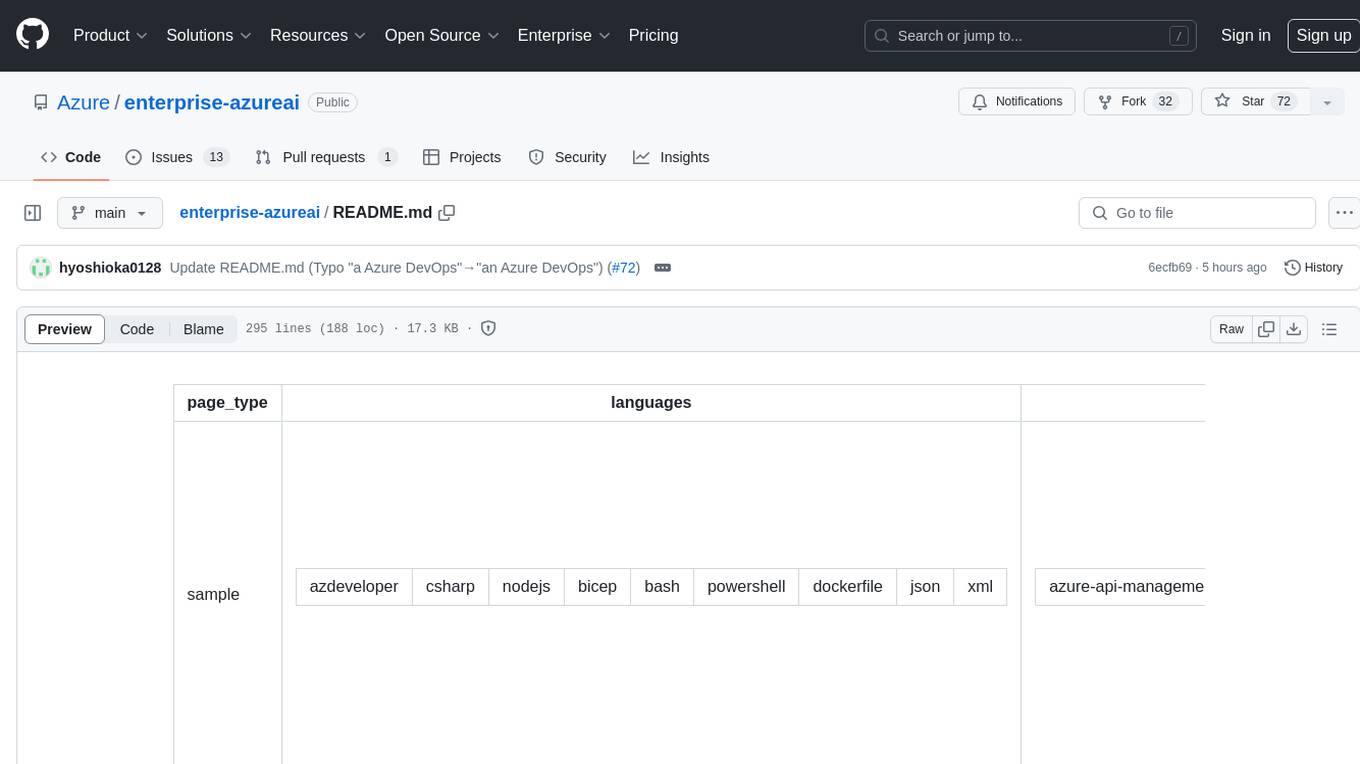
enterprise-azureai
Azure OpenAI Service is a central capability with Azure API Management, providing guidance and tools for organizations to implement Azure OpenAI in a production environment with an emphasis on cost control, secure access, and usage monitoring. It includes infrastructure-as-code templates, CI/CD pipelines, secure access management, usage monitoring, load balancing, streaming requests, and end-to-end samples like ChatApp and Azure Dashboards.
For similar jobs

weave
Weave is a toolkit for developing Generative AI applications, built by Weights & Biases. With Weave, you can log and debug language model inputs, outputs, and traces; build rigorous, apples-to-apples evaluations for language model use cases; and organize all the information generated across the LLM workflow, from experimentation to evaluations to production. Weave aims to bring rigor, best-practices, and composability to the inherently experimental process of developing Generative AI software, without introducing cognitive overhead.

LLMStack
LLMStack is a no-code platform for building generative AI agents, workflows, and chatbots. It allows users to connect their own data, internal tools, and GPT-powered models without any coding experience. LLMStack can be deployed to the cloud or on-premise and can be accessed via HTTP API or triggered from Slack or Discord.

VisionCraft
The VisionCraft API is a free API for using over 100 different AI models. From images to sound.

kaito
Kaito is an operator that automates the AI/ML inference model deployment in a Kubernetes cluster. It manages large model files using container images, avoids tuning deployment parameters to fit GPU hardware by providing preset configurations, auto-provisions GPU nodes based on model requirements, and hosts large model images in the public Microsoft Container Registry (MCR) if the license allows. Using Kaito, the workflow of onboarding large AI inference models in Kubernetes is largely simplified.

PyRIT
PyRIT is an open access automation framework designed to empower security professionals and ML engineers to red team foundation models and their applications. It automates AI Red Teaming tasks to allow operators to focus on more complicated and time-consuming tasks and can also identify security harms such as misuse (e.g., malware generation, jailbreaking), and privacy harms (e.g., identity theft). The goal is to allow researchers to have a baseline of how well their model and entire inference pipeline is doing against different harm categories and to be able to compare that baseline to future iterations of their model. This allows them to have empirical data on how well their model is doing today, and detect any degradation of performance based on future improvements.

tabby
Tabby is a self-hosted AI coding assistant, offering an open-source and on-premises alternative to GitHub Copilot. It boasts several key features: * Self-contained, with no need for a DBMS or cloud service. * OpenAPI interface, easy to integrate with existing infrastructure (e.g Cloud IDE). * Supports consumer-grade GPUs.

spear
SPEAR (Simulator for Photorealistic Embodied AI Research) is a powerful tool for training embodied agents. It features 300 unique virtual indoor environments with 2,566 unique rooms and 17,234 unique objects that can be manipulated individually. Each environment is designed by a professional artist and features detailed geometry, photorealistic materials, and a unique floor plan and object layout. SPEAR is implemented as Unreal Engine assets and provides an OpenAI Gym interface for interacting with the environments via Python.

Magick
Magick is a groundbreaking visual AIDE (Artificial Intelligence Development Environment) for no-code data pipelines and multimodal agents. Magick can connect to other services and comes with nodes and templates well-suited for intelligent agents, chatbots, complex reasoning systems and realistic characters.







